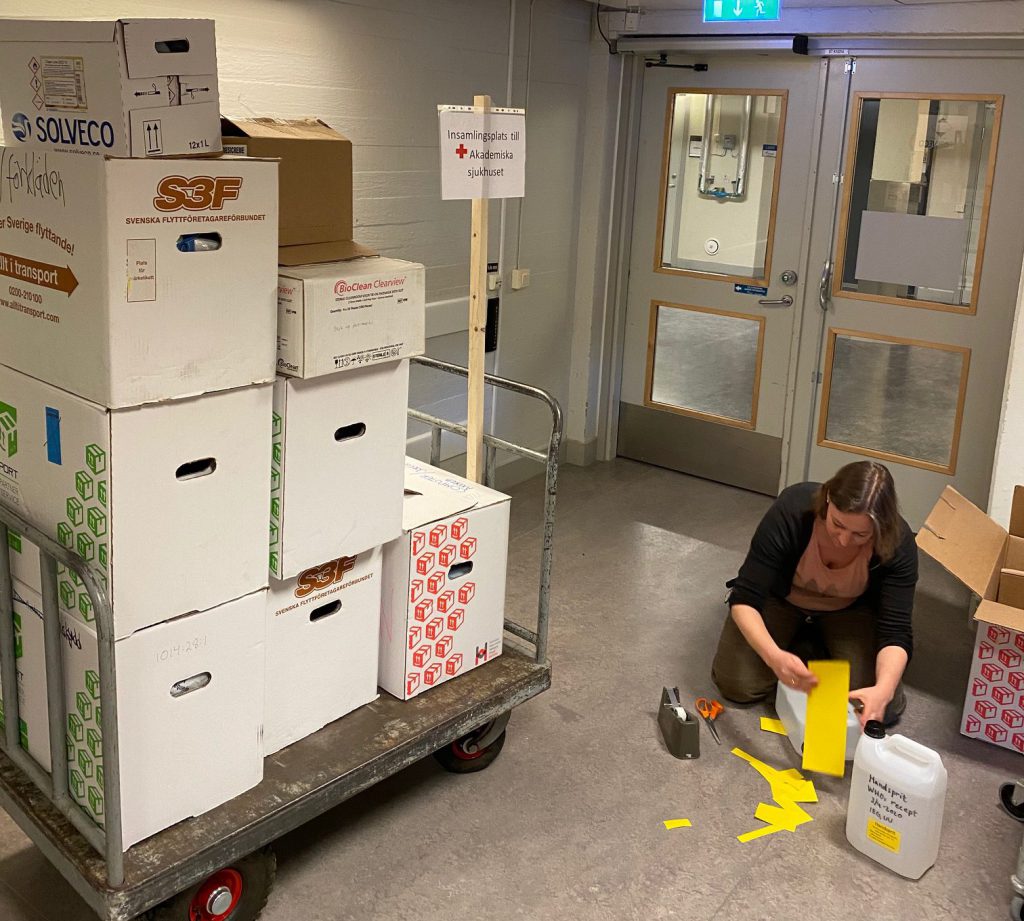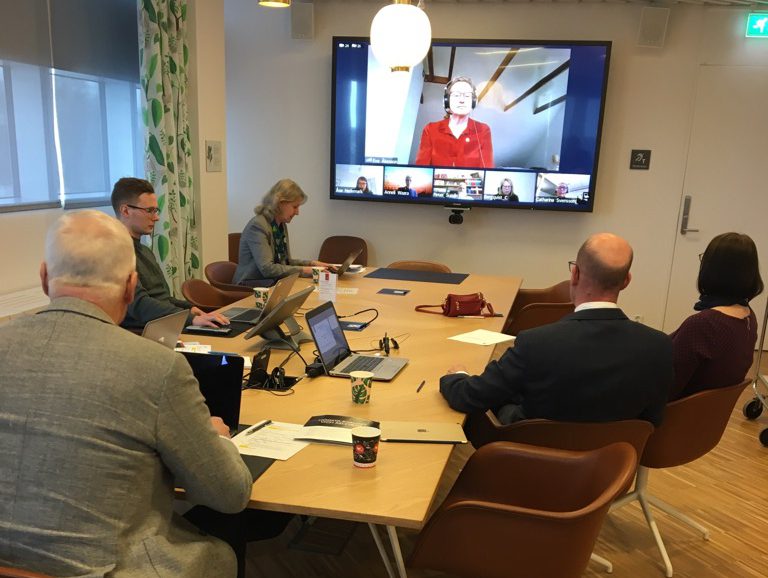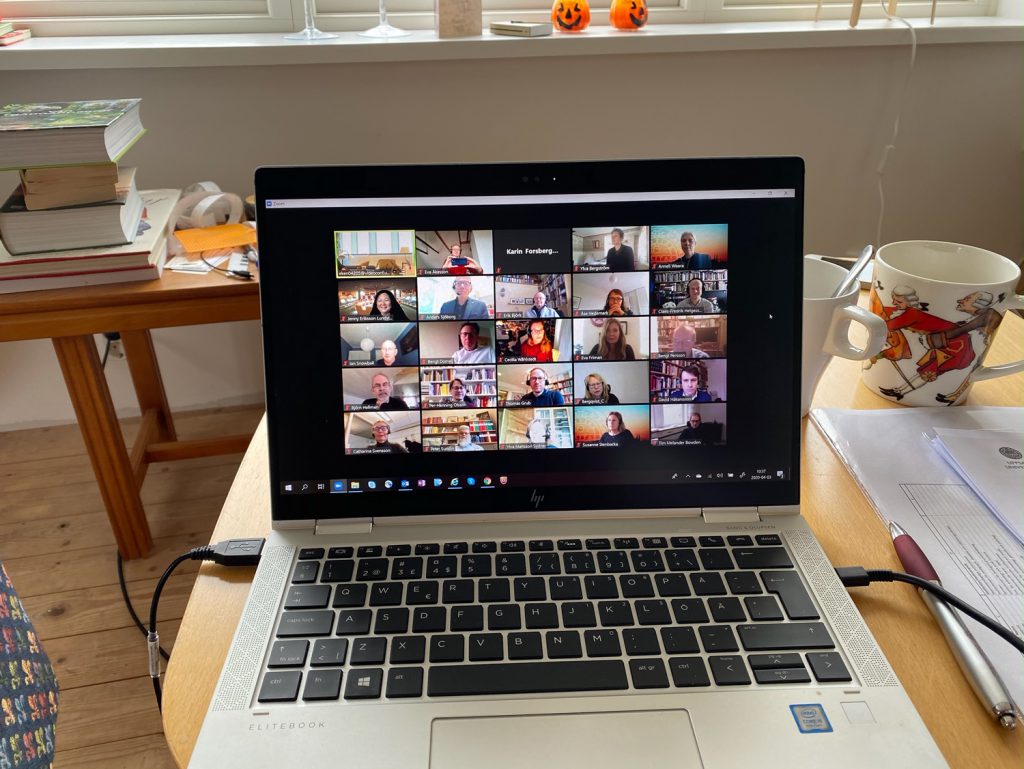
Yesterday afternoon a large batch of protective equipment went from Uppsala University to Uppsala University Hospital. Many departments and research teams have been keen to contribute and now the material has gone where it is needed most right now. More deliveries are expected next week. We are proud of the responsibility and willingness to help everyone at the University has shown.
On Thursday and Friday it was time for the spring overnight conference with heads of department, which was held remotely this year via Zoom. Several important issues were on the agenda and working in groups in virtual group rooms proved more successful than expected, though I am sure we all missed the networking that takes place between sessions when we meet in real life.
We started on Thursday with a productive session on dilemmas, led by Professor of Practical Philosophy Folke Tersman. Heads of department bear the ultimate responsibility for their department’s activities and not infrequently, this means they end up in situations that are far from easy to resolve. In his presentation, Professor Tersman emphasised the importance of preparation when confronting a difficult decision and gave some practical advice.
- Look into the legal aspects of the matter, as well as ethical guidelines and fundamental values
- Identify which values and principles are in conflict
- Try to be creative about possible solutions
- Take time to listen to colleagues, but make your own decision and don’t be afraid of making mistakes.
Professor Tersman suggested giving heads of department a chance to practice arguing for and against in situations in which values come into conflict with one another, and practice in standing up for their own assessment. It was an interesting session and valuable to bear in mind during the rest of the day, which focused on our ongoing projects on the role of head of department, careers, teaching and learning qualifications, and appointments. It was important that we were able to bring the breadth of our University to bear on these closely associated issues and had an opportunity to exchange ideas. We believe this will make for a better outcome.

Managing to recruit and retain the best staff is crucial for continued success and at the end of the year we will have new appointment regulations that will underpin these efforts. Project manager Ann Fust presented the work to date and highlighted some of the key issues they are wrestling with. One such issue is how the University should best deal with its many research appointments, which offer little security and few career opportunities. There will be more opportunities to discuss the contents of the proposed new appointment regulations, which will be presented to the University Board in June before the final report in the summer.
Yesterday’s programme began with an overview of University-wide issues, presented by the University Management. The annual report provides us with a welcome stable foundation for the operational planning process, which recently began, and where we aim to stick to the timetable and provide a stable budgetary framework for the University’s operations. The University’s positive development allows us to press steadily onward, despite the extremely uncertain social situation caused by COVID-19. We had a chance to express our sincere thanks to everyone who has worked hard to keep things going, despite the transition to virtual activities, and we took up some of the questions that have come from different parts of the University. With regard to distance education, we were able to reassure everyone that we will not be deciding on an abrupt return to on-campus instruction. That transition, when it becomes possible, must proceed in an orderly manner, at the time that is most appropriate for the particular course or programme.

The next session dealt with the implementation of the University’s Mission, Goals and Strategies, where the disciplinary domains will receive instructions from the Vice-Chancellor to develop relevant indicators for follow-up together with the faculties and departments. These indicators are intended to support implementation, not to serve as a basis for allocating resources. Plenty of time is being allowed – proposals are to be delivered to the Vice-Chancellor in May 2021. It is important that the indicators have broad acceptance after thorough discussion at local level.
We went on to have a good look at the progress on the new premises plan. The proposal will contain some common principles for rent and vacancies and a model consisting of three-year plans based on more long-term plans drawn up by the disciplinary domain boards. The proposal will soon be referred for comments by 15 September.

The final item in this, our first marathon Zoom meeting of heads of department, was led by Adviser to the Vice-Chancellor on Good Research Practice Stefan Eriksson. He talked about the factors that best support a creative and successful research environment, based on studies on the subject. Supportive leadership, a cooperative climate and good infrastructure are examples of favourable factors, while pressure and competition can have negatve effects. Discussion sessions in smaller groups in separate Zoom breakout rooms helped to identify further interesting aspects of the issue, such as the link between staff turnover and research environment, and the role of introductory programmes.
Our thanks to everyone for your commitment and involvement, which reinforce our joint efforts for the future of Uppsala University!
